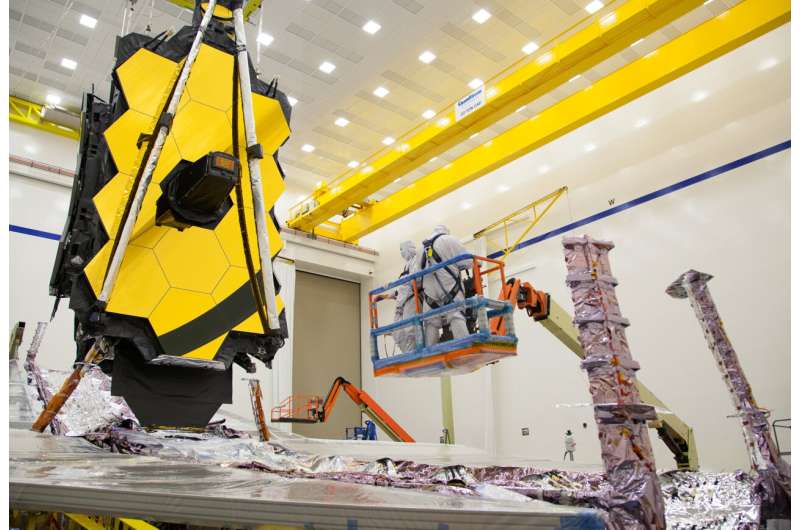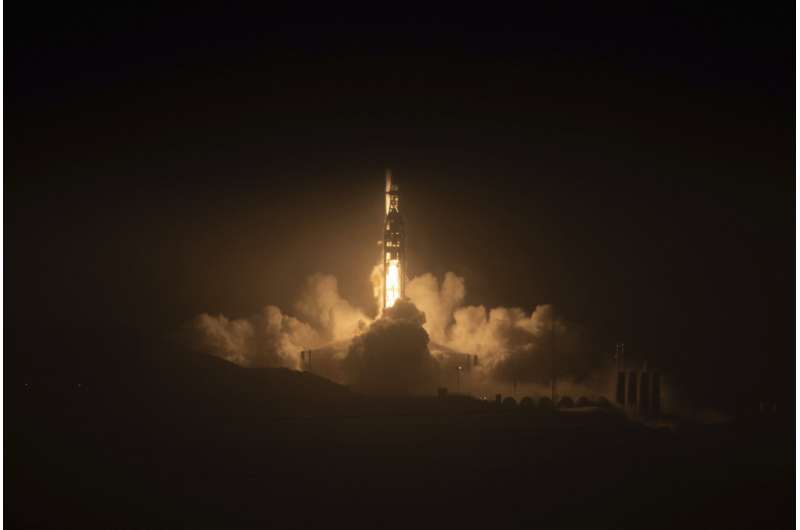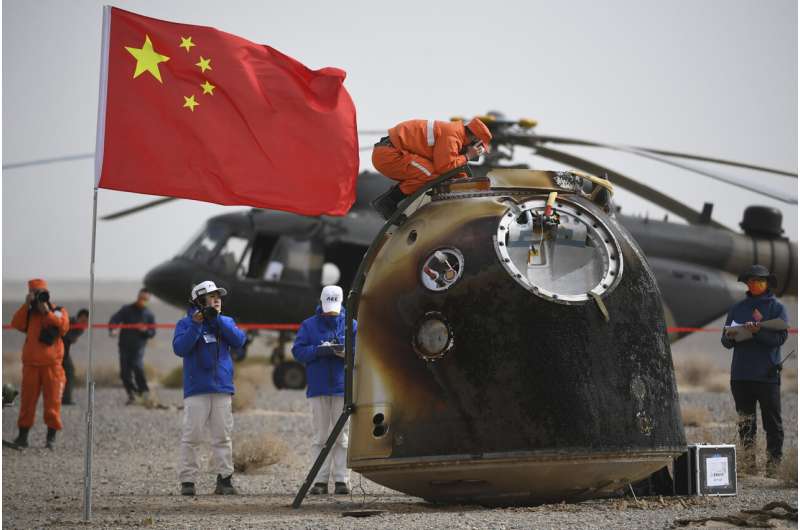
Copernical Team
Excitement building at Baltimore institute for the James Webb Space Telescope's observations

The image dazzles from a computer screen in the corner of the room: six beams of red-orange light bursting from a luminous Milky Way star.
But the most entrancing part of the picture—among the public's first dispatches from the revolutionary James Webb Space Telescope—lies in the background, where amorphous blobs are really swirling galaxies.
From a desk across the room in Baltimore's Space Telescope Science Institute, astronomical optics scientist Charles LaJoie zooms in, and even more cloudlike spirals appear, once concealed in the reaches of space.
For the scientists at the institute—the hub for all things Webb—the image is there as a reminder of what's to come. When all of Webb's 18 mirror segments are completely aligned, likely before the end of April, astronomers will be able to peer deeper into the cosmos than ever before.
To the astronomers in the room, seeing a background of galaxies from behind the world's most powerful telescope was anticipated. But for the engineers, focused for so long on building the telescope, it was a "wow moment," said Lee Feinberg, Webb's optical telescope element manager for over 20 years.
US intelligence satellite launched from California

China sending up next space station crew in June

MetOp-SG-B weather satellite: Scatterometer flies through tests
 The flight model of the Scatterometer Antenna Subsystem (SAS) of the MetOp Second Generation meteorological satellites has been officially delivered after four months of extensive testing at the Airbus facility in Madrid. It will now be transferred to Airbus in Friedrichshafen (Germany) where it will be integrated into the satellite along with the other instruments.
The SAS protoflight mod
The flight model of the Scatterometer Antenna Subsystem (SAS) of the MetOp Second Generation meteorological satellites has been officially delivered after four months of extensive testing at the Airbus facility in Madrid. It will now be transferred to Airbus in Friedrichshafen (Germany) where it will be integrated into the satellite along with the other instruments.
The SAS protoflight mod Hughes announces distribution agreement with OneWeb Technologies
 Hughes Network Systems, LLC (HUGHES), an innovator in satellite and multi-transport technologies and networks for 50 years, has announced it signed a distribution agreement with OneWeb Technologies Inc., a wholly owned subsidiary of OneWeb, to deliver managed Low Earth Orbit (LEO) services to the U.S. Department of Defense (DoD). The agreement follows the launch of the industry's first managed L
Hughes Network Systems, LLC (HUGHES), an innovator in satellite and multi-transport technologies and networks for 50 years, has announced it signed a distribution agreement with OneWeb Technologies Inc., a wholly owned subsidiary of OneWeb, to deliver managed Low Earth Orbit (LEO) services to the U.S. Department of Defense (DoD). The agreement follows the launch of the industry's first managed L Diverse life forms may have evolved earlier than previously thought
 Diverse microbial life existed on Earth at least 3.75 billion years ago, suggests a new study led by UCL researchers that challenges the conventional view of when life began.
For the study, published in Science Advances, the research team analysed a fist-sized rock from Quebec, Canada, estimated to be between 3.75 and 4.28 billion years old. In an earlier Nature paper*, the team found tiny
Diverse microbial life existed on Earth at least 3.75 billion years ago, suggests a new study led by UCL researchers that challenges the conventional view of when life began.
For the study, published in Science Advances, the research team analysed a fist-sized rock from Quebec, Canada, estimated to be between 3.75 and 4.28 billion years old. In an earlier Nature paper*, the team found tiny Oldest evidence of Mayan calendar found in Guatemala
 The oldest evidence of the Maya calendar has been excavated at San Bartolo, Guatemala, found among fragments of painted murals.
Acording to a new study, two fragments with a "7 deer" date notation date to between 300 and 200 BCE, based on radiocarbon dating.
Authors of the study said that the finding "represents a day in the 260-day divinatory calendar used throughout Mesoamerica
The oldest evidence of the Maya calendar has been excavated at San Bartolo, Guatemala, found among fragments of painted murals.
Acording to a new study, two fragments with a "7 deer" date notation date to between 300 and 200 BCE, based on radiocarbon dating.
Authors of the study said that the finding "represents a day in the 260-day divinatory calendar used throughout Mesoamerica Three Chinese astronauts return to Earth after six months in space
 Three Chinese astronauts returned to Earth on Saturday after 183 days in space, ending China's longest crewed mission as it continues its quest to become a major space power.
The Shenzhou-13 spacecraft was the latest mission in Beijing's drive to rival the United States, after landing a rover on Mars and sending probes to the Moon.
Live footage from state broadcaster CCTV showed the caps
Three Chinese astronauts returned to Earth on Saturday after 183 days in space, ending China's longest crewed mission as it continues its quest to become a major space power.
The Shenzhou-13 spacecraft was the latest mission in Beijing's drive to rival the United States, after landing a rover on Mars and sending probes to the Moon.
Live footage from state broadcaster CCTV showed the caps Xi calls on Wenchang to build world-class spaceport
 President Xi Jinping has called on the Wenchang Space Launch Center in the southern island province of Hainan to build itself into a world-class spaceport.
Xi made the remark on Tuesday afternoon as he visited the launch complex, the newest and southernmost of its kind in China.
Xi, who is also general secretary of the Communist Party of China Central Committee and chairman of the Ce
President Xi Jinping has called on the Wenchang Space Launch Center in the southern island province of Hainan to build itself into a world-class spaceport.
Xi made the remark on Tuesday afternoon as he visited the launch complex, the newest and southernmost of its kind in China.
Xi, who is also general secretary of the Communist Party of China Central Committee and chairman of the Ce Shenzhou 13 astronauts ready to return
 China's Shenzhou XIII mission crew have completed all of their tasks and will return to Earth, according to the China Manned Space Agency.
The agency said on Thursday night that the astronauts - Major General Zhai Zhigang, Senior Colonel Wang Yaping and Senior Colonel Ye Guangfu - will leave the Tiangong space station in due course. Their reentry capsule will touch down at the Dongfeng lan
China's Shenzhou XIII mission crew have completed all of their tasks and will return to Earth, according to the China Manned Space Agency.
The agency said on Thursday night that the astronauts - Major General Zhai Zhigang, Senior Colonel Wang Yaping and Senior Colonel Ye Guangfu - will leave the Tiangong space station in due course. Their reentry capsule will touch down at the Dongfeng lan 